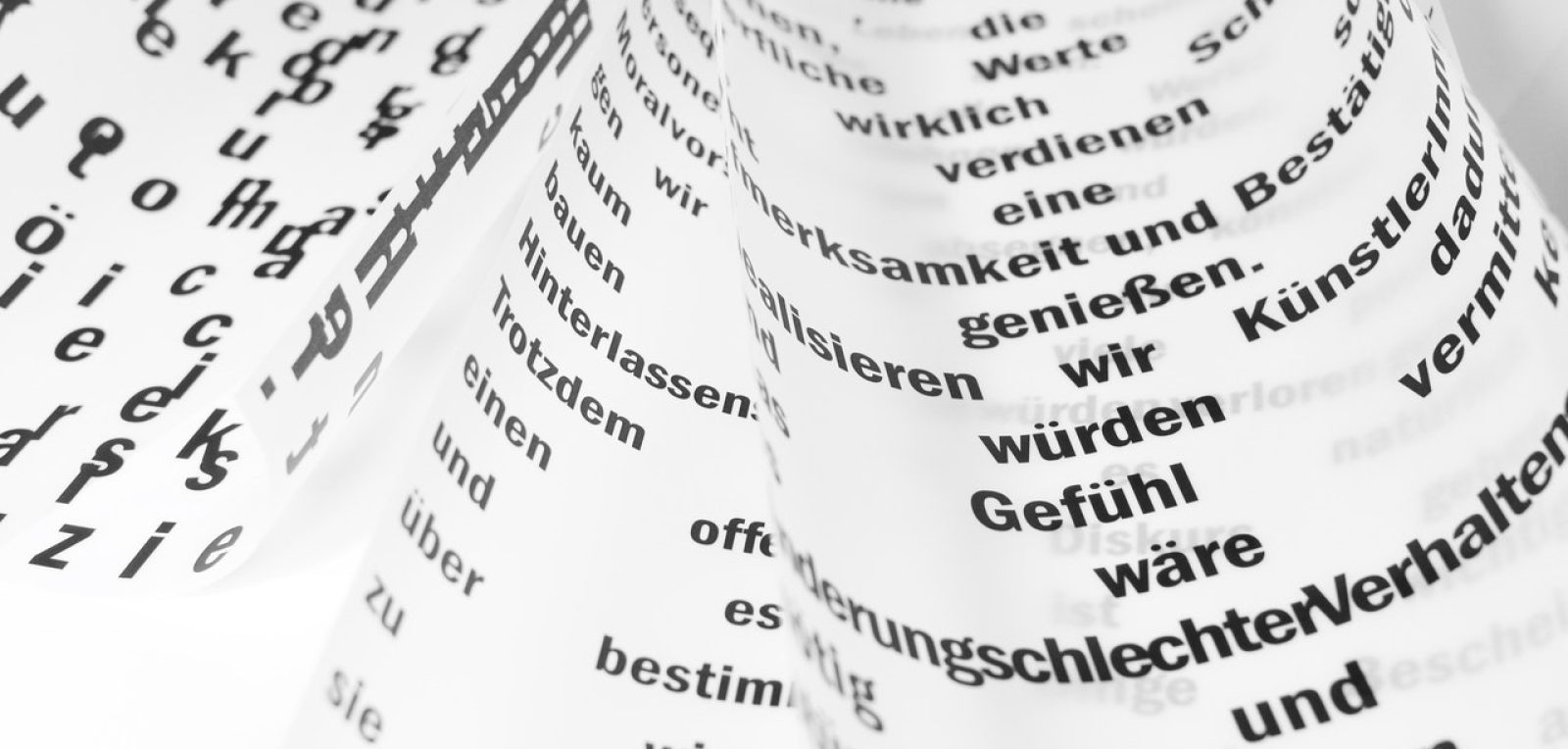Still can’t get the hang of some hard German words when practicing solo or in conversation? We bring you some tips and tricks to pronounce the hardest German words right!
Build on the language basics
Remember the longest-known German word up until 2019? We wouldn’t blame you if you didn’t! Rinderkennzeichnungs- und Rindfleischetikettierungsüberwachungsaufgabenübertragungsgesetz, meaning “cattle marking and beef labeling supervision duties delegation law,” was dumped the same year as the legislation’s repeal.
Then why are we talking about a now-defunct word? It’s because it’s a prime example of the extent to which German takes compound word formation. It’s no wonder, then, that language learners hesitate to pick German as their target language, or that they struggle to reach fluency when they do.
But don’t be put off learning those hard German words to pronounce perfectly just yet. First, here are a few tried-and-tested tips and tricks to help you speak the language comfortably.
Learn the sounds first, and the words will follow
Did you know that it’s way easier to pronounce both easy and hard words in German than it is in English? Want to know why that is? It’s because German is among the few languages in the world that have a consistent phonetic pronunciation. This means that its letters and their combinations normally always sound the same, regardless of their position in a word or utterance.
This is far from the case in English. Replay the sounds of the words “vase,” “base,” and “grass;” or the noun and verb forms of “sow,” “bow,” and “row” in your head. It’s sheer inconsistency at its best, with no real logic or pattern to help you make sense of things.
On the other hand, consistency is what will help you learn the German alphabet, to eventually master pronunciation in the language. Knowing each of the sounds that make up the letters will give you the tools to know how to say practically every German word in existence, including those that are hard to pronounce. And, as with everything worth knowing, practice will make perfekt.
To get started with learning the vowels and consonants that make up German vocabulary, check out our German Pronunciation Trainer Resources page for free instructional videos.
Pronunciation tips: Once you get through the easier sounds, practice the typical German trilled ‘r’ until you get it right. Also, keep in mind that the umlaut vowels ä,ö, and ü sound like ‘e’ in ‘men,’ ‘i’ in ‘swirl,’ and double ‘o’ in ‘boot,’ respectively. One more phonetic sound of note in German, the ß, is like a double ‘s’ in English.
But don’t just practice solo to perfect your pronunciation. Find a language exchange partner, or work with a private coach who’s a native speaker, to help you get those sounds 100% right and correct any imperfections.
Complex word? Break it down!
Our next trick to help you pronounce longer and more complex hard German words correctly is to consider the shorter, individual words that make them up.
Unlike English, German tends to combine shorter words into a longer “closed” compound word, with no spaces or hyphens separating its constituents. Think “banking services” and its German equivalent bankdienstleistungen, or “windshield wiper” and windschutzscheibenwischer. And those are only basic examples, as in German, it’s theoretically possible to link an unlimited number of smaller words to form a compound.
So go ahead and deconstruct a long word into its single-word components. Practice speaking the individual parts before tackling the whole word in one breath. This will make new vocabulary sound far less intimidating, and your attempts at pronunciation far less of a challenge than you initially thought. Trust us on this!
Now, without further ado, let’s get ready to master the sounds of some commonly occurring hard German words.
Get practicing with these 10 hard-to-pronounce German words
Here are a few examples that are commonly said to be among the hardest German words to pronounce correctly, featured in alphabetical order.
Brötchen
Care for a couple of brötchen? Pronounced [ˈbʁøːtçən], these small bread rolls come in savory or even spiced or sweetened versions which Germans typically eat for the most important meal of the day. So hurry: you have until breakfast time to focus on the /øː/ plus /tç/ combination and get it right.
Eichhörnchen
You’re probably thinking that pronouncing the ‘chh’ sequence in this German word for squirrel sounds absolutely nuts (pun intended). Divide it into eich and hörn-chen, and you’ll see that it instantly gets easier to eventually get to [ˈaɪ̯çˌhœʁnçən].
Practice makes perfect, and the squirrel smile!
Image by Pixabay from Pexels
Kraftfahrzeughaftpflichtversicherung
Coming in at 36 letters, one of the most hard-to-pronounce German words received official recognition by the highly reputable German dictionary, Duden, as its longest word entry. It means “motor vehicle liability insurance,” and breaking this down into kraftfahrzeug (motor vehicle) and haftpflichtversicherung (liability insurance) will help you pronounce it right. And there you have it: [ˈkʁaftfaːɐ̯t͡sɔɪ̯kˌhaftpflɪçtfɛɐ̯zɪçəʁʊŋ]!
Kreuzschlitzschraubenzieher
Translating as “Phillips head screwdriver,” you never know when this hard German word might come in handy! So, what tools can we equip to nail its pronunciation? (Puns happily intended once again). Here’s a trick: separate it into kreuz (cross), schlitz (slot), and schraubenzieher (screwdriver), making sure these stick before you attempt [ˈkʁɔɪ̯t͡sʃlɪt͡sˌʃʁaʊ̯bn̩t͡siːɐ] in one go.
Quietscheentchen
See how far this rubber duck can stretch! Break this hard German word down into quietsche (the verb quietschen means “to squeak”) and ent-chen (duckling) first, then run yourself a rewarding bath once you succeed to pronounce [ˈkviːt͡ʃəˌʔɛntçən].
Hint: Remember that ‘qui’ has a ‘kvi’ sound in German.
Rechtsschutzversicherung
One of those typical German compound words made up of multiple single-word elements, rechtsschutzversicherung draws its meaning from echts (legal), schutz (protection), and versicherung (insurance) to denote “legal protection insurance,” or similarly, “legal costs insurance.” Practice pronouncing these three words separately before attempting [ˈʁɛçt͡sʃʊt͡sfɛɐ̯ˌzɪçəʁʊŋ] all at once.
Schlittschuhlaufen
To learn how to say this hard-to-pronounce German word, divide it into schlittschuh (ice skate) and laufen (run/walk) to eventually form [ˈʃlɪtʃuːˌlaʊ̯fn̩]. What about its meaning? You guessed right: it’s ice skating all the way. So get practicing, and break a leg (or…not)!
Streichholzschächtelchen
If you’re ever looking specifically for a small box of matches, streichholzschächtelchen – the diminutive of streichholzschachtel, or “matchbox” – is the word you’re after. Break it down into its components streich, holz, and schächtel-chen to help you arrive at [ˈʃtʁaɪ̯ç.hɔl(t)sˌʃɛç.təl.çən].
Hint: When pronouncing the frequently occurring ‘ch’ sound in this word, think cats hissing at the sight of a match being struck.
Umweltverschmutzung
Deriving from the autonomous words umwelt (environment) and verschmutzung (pollution or soiling), and therefore meaning “environmental pollution,” umweltverschmutzung is pronounced [ˈʊmvɛltfɛɐ̯ˌʃmʊʦʊŋ]. Once again, it is advisable to start off by saying the two word components out loud individually before combining them in a single utterance.
Wettbewerbsfähig
Feeling ready to rise to the final challenge in this exercise in pronouncing hard German words? How about the word for “competitive,” then? Roughly, its English literal translation is “able (fähig) for competition (wettbewerb),” so you can kick off your pronunciation practice by saying those two words and following with the full [ˈvɛtbəvɛʁpsˌfɛːɪç] when you’re ready.
The German experiment
Back in 2012, way before our revolutionary language learning app was born, Fluent Forever founder and CEO Gabriel Wyner set out on a mission to identify the hardest German sounds for English speakers who didn’t know the language. The experiment consisted of a four-part test containing recordings of minimal pairs, which he designed to determine those sounds that potential learners of German would struggle with the most. The exercise led to the following results and analyses. Take it away, Gabe!
Here are the (most important) word pairs that caused problems:
Scale
1 – Sound the same (mit/mit)
2 – Very similar (drücken/drucken)
3 – Similar (pfüte, pföte)
4 – Different (pfeet/pfit)
5 – Completely different (meat/mat)
Some survey analysis
The long vowels in biete/bete [i]/[e] and bote/bute [o]/[u] are extremely close in German, and I wasn’t surprised to see them at the top of the list.
Then comes a whole mess of difficulty between ströck [œ]/strück [ʏ]/struck [ɪ]/strick [ʊ]. Every combination of [œ], [ʏ], [ɪ] and [ʊ] was difficult, except for struck [ɪ]/strick [ʊ], which exists in English already (put/pit). I had trouble saying them a few times, which I’m sure didn’t help, but it’s a pretty challenging little group!
Aside from the major problem between the German [u] and [o] (bute/bote), there were some minor difficulties with every combination of büte [y], böte [ø], bute [u], and bote [o], except büte/bote [y]/[o]. Why that last combo seems easier than the rest of them may just be experimental error. (For the statisticians out there: average 3.8, standard deviation 0.8.)
The other minor difficulty seemed to be strock [ɔ] in contrast with strack [a] and struck [ʊ].
I’ve been preparing a list of tricky sounds in German, and this may be the last piece of the puzzle. I didn’t bother to test short vowels (offen [ɔ]) vs long vowels (ofen [o:]) because I already knew they were hard, and the quiz would have taken forever. Examples of these pairs are:
offen/ofen [ɔ]/[oː], ass/aas [a]/[aː], busse/buße [ʊ]/[uː] (easier: similar to put/poot), bett/beet [ɛ]/[eː], widder/wieder [ɪ]/[iː] (easier: similar to pit/peet), hölle/höhle [œ]/[øː], fülle/fühle [ʏ]/[yː], bären/beeren [ɛː]/[eː]
The only other vowel problem in German seems to be the two schwas (which is quite difficult!): schöne/schöner [ə]/[ɐ].
I could also imagine some tricky consonant pairs between German and English: dich/dish, buch/book, bach/balk, rot/wrote, pfan/fun, tier/tear (drop); as well as some vowel/diphthong pairs between German and English:
German [o] (not) vs American [oʊ] (know), German [e] (see) vs English [eɪ] (say), German [ɔʏ] (neu) vs English [ɔɪ] (boy), German [ɐ] (schöner) or [ə] (schöne) vs American [ɚ] or British [ə] (river), and perhaps German [u:] (ute) vs some dialects of American [ʊu] (loon)
So…what?
Moving forward
I’m planning on making some effective pronunciation tools for as many languages as possible. There just isn’t very much for pronunciation out there, aside from YouTube tutorials and a few pronunciation guides online, and very few tests with immediate feedback, which seem to be the most effective method studied so far. (There are a few apps that will test you on your ability to hear Chinese tones, but I’m not aware of anything else like that.)
Tester: Is this schöne or schöner? (pause) Schöner.
Student: Schöne.
Tester: Incorrect. It was schöner.In the linked study above, three 20-minute sessions of this sort of testing were able to (permanently) teach Japanese speakers to hear the L-R distinction in English. Anki provides immediate feedback, so there’s no reason why we can’t have some decent tools based upon this research, if we can find out where the problem sounds are and make good recordings. So stay tuned. I don’t know how long they’ll take, but I’ll get them done.
Final notes on the quiz
This was not a robust scientific study, although I do think I got good, useful data from it. I’m not a native speaker, so I would have to do it again with a native speaker recording to get valid data. Also, I’ve learned that I’m not supposed to use the 1-5 Likert scale for this sort of test. Rather, I should say “struck/strück…struck” or “struck/strück…strück,” and you’re supposed to say which one it was. I kind of prefer the Likert scale because there are times when I can hear a difference, but it’s so slight that I know it would cause me problems in the future, and I certainly would have trouble saying it, but I definitely understand the criticism. I’m also not supposed to say why I’m doing the test (“This is to figure out the hardest sounds in German,“ etc.) I’ll keep some of this in mind for the next test (probably French).
Perfecting your pronunciation skills
Those were some interesting findings and observations, right? It’s also inspiring to see how much Fluent Forever has grown since then, drawing from research such as this one to build one of the most effective language learning methods out there, completely automated in the form of a handy mobile app. Download it here to start your language learning journey in one of the 12 languages currently available, if you haven’t done so already.
And remember: when it comes to pronouncing hard German words, take it step by step, and word by word you’ll surely get there! Tap into our free-to-use list of useful German language resources, make sure you complete those essential Pronunciation sessions in the app regularly, and maybe even join the Fluent Forever Coaching program to practice speaking with a native speaking tutor. We’re here to help you get those hardest German words to pronounce under your belt once and for all.






